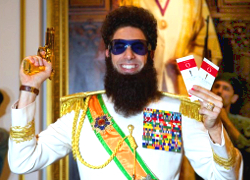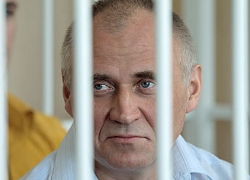By Andrei Sannikov,
Andrei Sannikov, leader of the European Belarus civic campaign, is a former presidential candidate and political prisoner in Belarus.WARSAW
The world’s attention has recently been focused on the brave people of Ukraine, who have held large rallies in support of joining Europe rather than falling into the “embrace” of Russia. But it is also important to remember Ukraine’s northern neighbor Belarus, a country that lies geographically in the heart of Europe but politically is more akin to a Soviet backwater. The majority of its citizens want to be free, but they are repressed by a brutal dictator more ruthless and despotic than Ukrainian President Viktor Yanukovych and Russian President Vladimir Putin combined.
As a presidential candidate in Belarus three years ago, I took part in massive demonstrations the size of which my country had not seen for years. In central Minsk, people from all walks of life braved a police state, and the cold, to protest the widespread election fraud by which Belarusan dictator Alexander Lukashenko stole the presidential election. We also backed a future that lies with Europe, not a re-created Soviet Union.
This demonstration of the people’s will scared Lukashenko and his thugs. Riot police brutally broke up our peaceful rally and beat women, senior citizens and anyone else they could reach, evoking images not seen in my country since the end of World War II. I spent that Christmas and the next — altogether more than a year — in a Soviet-era jail as a political prisoner. I was released as a result of a rare demonstration of political will on the part of the European Union, which imposed sanctions on Lukashenko’s financial supporters. However, additional sanctions planned by the European Union didn’t materialize, partly because of intense lobbying by Latvia and Slovenia, and numerous other political prisoners remain in prison in Belarus, including my colleague, presidential candidate Mikalai Statkevich, and human rights defender Ales Bialiatski.
The European Union’s lack of will and strategy in dealing with countries on its periphery began with it turning a blind eye to Lukashenko’s undemocratic consolidation of power in the mid-1990s. As Europe experienced an unprecedented period of economic success, great expectations and enlargement, and as it declared a commitment to common democratic values and human rights, Lukashenko rigged elections while his opponents mysteriously disappeared. The E.U. responded by suspending relations with the regime but didn’t take more serious steps such as launching investigations. Instead, the E.U. simply hoped that the next election would be fair. Popular opposition leaders Yuri Zakharenko and Viktor Gonchar were then murdered in 1999, and Gennady Karpenko died under mysterious circumstances. Each had enjoyed broad support and could easily have won against Lukashenko. As Lukashenko constructed modern Europe’s most repressive and totalitarian system, the European Union didn’t react adequately.
Europe today faces a very real crisis of values. The European Union simply does not see its mission as strengthening and developing democratic values in Europe itself, despite its declaration that the Eastern Partnership program, in which Eastern neighbors including Belarus build ties with the E.U., is a framework based on them. Instead, the program has turned out to be just another means of justifying diplomacy and trade with autocrats — including maintaining a relationship with the dictator Lukashenko by returning to a policy of “dialogue” with Minsk.
Ukrainians are rejecting their corrupt leader through their Euromaidan protests. It was encouraging to see European and U.S. politicians, such as Sen. John McCain, Polish members of the European Parliament and Swedish Foreign Minister Carl Bildt, come to the central square in Kiev to bolster them. However, strong moral support is not enough when the Kremlin has stepped in with loans and cheaper gas — not to help Yanukovych per se but to defend the model of dictatorial rule in the region.
The E.U. believes it can maintain its own institutions and values while engaging and trading with undemocratic neighbors such as Belarus, Ukraine and Russia at no political or moral cost to itself. This is a mistake. No amount of “engagement” or “realpolitik” overtures toward autocrats is going to create predictable, safe neighbors for the European Union.
It is not a question of if but when Belarusans will rid themselves of Europe’s last dictatorship and join the community of European democracies. The strategy for doing so has to be built on principles. Lukashenko must be sanctioned for the crimes he has committed, and the people of Belarus must be engaged. By supporting democratic movements, free media and freedom fighters, along with transparent cooperation and concerted diplomacy with the European Union, the Obama administration can significantly reduce this time from years to months.
By Andrei Sannikov,



